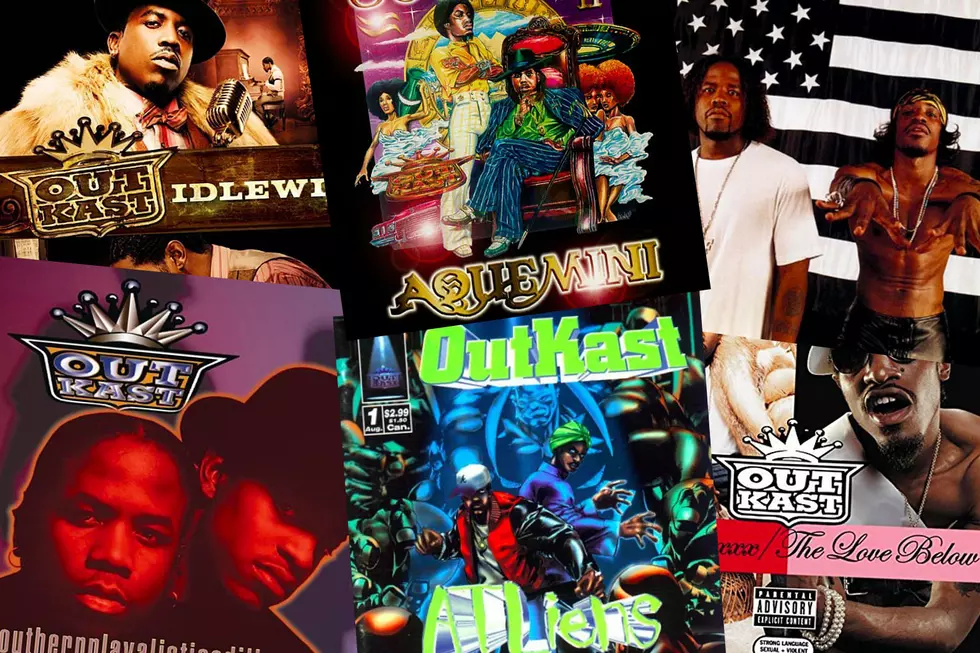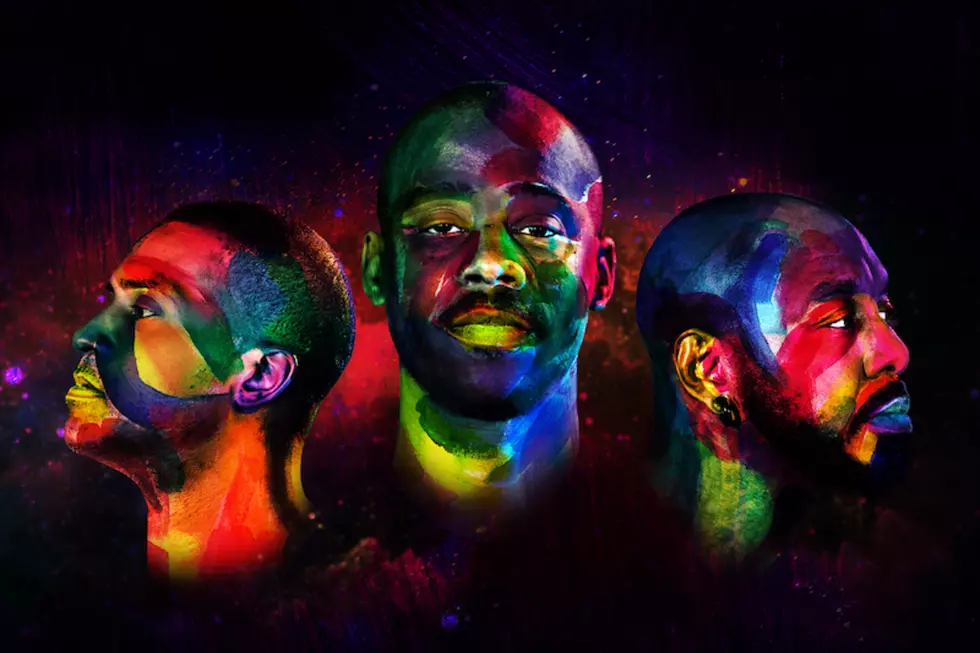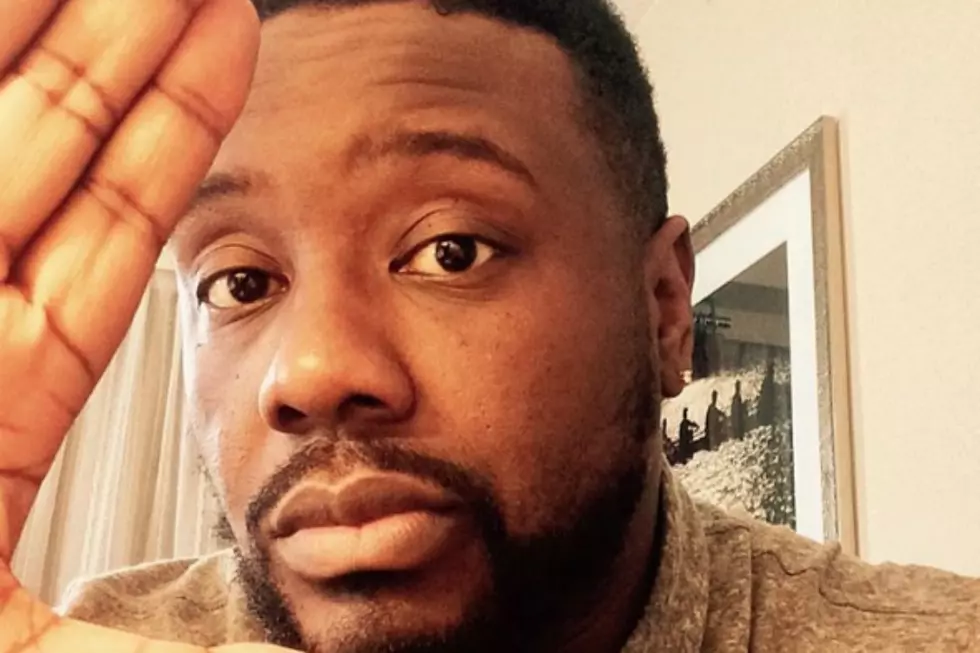
Organized Noize Talks About Atlanta, Oversaturation, and Their New Doc
Organized Noize means a lot to hip-hop; and especially to Atlanta.
Gallery 72 is packed. It’s the opening night for Atlanta’s public arts initiative Elevate, and the space is more hip-hop than fine art. OutKast's “So Fresh, So Clean” blares from the speakers. People rap along, excited to be in one another’s presence. It’s curious given that the space, located in the heart of downtown Atlanta, is municipally owned, hosted by the Atlanta Office of Cultural Affairs. But the theme for 2015's Elevate was F.I.L.A. (Forever I Love Atlanta), and when celebrated artist Fahamu Pecou was tapped to curate the event, one culture-bearer for the city immediately came to mind the legendary production unit.
You can’t really talk about culture in Atlanta without talking about Organized Noize, an amazing feat for any American city, particularly one so drenched in civil rights history. It’s a testament not only to music and hip-hop, but to the power and influence Organized Noize had in shaping both music and culture.
“We carried Atlanta on our back, so it felt great for Atlanta to take it off our back and be like, ‘thanks guys,’,” Rico Wade, one-third of the production unit says. “It showed our history. For me, [being acknowledged in that way] felt really good, like taking a big breath, like ‘wow, finally’. It was important that our city stood beside us because we stood beside it, our lives. We’re the ones who said ‘Atlanta’. We came out first, way before the Braves championship. Before we came out with OutKast, Atlanta really didn’t have a victory.”
He pauses, then laughs. “We could probably run for office in Atlanta. Not just because of the music but because of the principals and morals.”
And therein lies the power of Organized Noize. It was never just about the music for Wade, Ray Murray and Pat “Sleepy” Brown. It was about the process—the soul, the heart, sweat, grime and love poured into the music. It’s what separated them from other musicians then and now.
Truth be told, the new Organized Noize documentary, The Art of Organized Noize, which will debut at SXSW and on Netflix on March 22, needs a sequel. Produced by Flava Unit and Quincy Jones' son, hip-hop producer QDIII, the documentary is a thorough, two-hour long examination of one of the most prolific production units to touch music in recent history but, as Murray says, there’s just so much more to tell.
“Because our story is so deep and big in terms of the associations and connections and everything… we’re gonna have to do a part two,” Murray insists, adding that they also have plans to independently release a three-part album The Art of Organized Noize, which will feature unreleased material recorded between 2000-2012 and instrumentals. “This is just a peek into what it is.”
When Rico Wade, Pat “Sleepy” Brown and the aforementioned Murray produced what would be their first major label release, OutKast’s Southernplayalisticadillacmuzik, they knew they were one to something special. The Atlanta-bred threesome gave birth to an entirely new sound in hip-hop, based on their individual love of funk, soul, rock and hip-hop. The result was a sound so innovative and off-beat, so forward-leaning but accessible, it’d quietly become a blueprint, not just for production but for an entire culture looking to do away with creative restrictions. Producer Bryan Michael-Cox,Ludacris, 2 Chainz, Kane Beats, Metro Boomin and more make an appearance in the documentary, but that doesn't being to cover Organized continued impact. J. Cole, Drake and most recently, Kendrick Lamar's work echoes the production unit's influence.
“You can’t plant seeds and start a movement and just have the movement totally disappear,” Wade animatedly explains, speaking of the imprint they left on a generation of hip-hop talent. “You can tell people are inspired by what we did back then and they might not even know it. They don’t understand that some of the things we did opened it up for what they’re doing. They might not know who we are but I feel the nostalgia, I hear the vibe. What these kids are trying to get to is where we were at.”
And it’s true. In 1994, When ‘Kast first dropped, it opened the door for what would be become the Organized Noize sound and the influence of the entire Dungeon Family. Funk-laced production, creative samples, hard drums, ethereal keys and Afro-futuristic, otherworldly vision and concepts made their sound nearly impossible to directly emulate, which was significant during a time when producers were eager to make a name for themselves by working with whoever was hot.
“We didn’t over saturate our sound when it was cool to do it,” Wade says, adding that they probably could have capitalized financially on their talent more.
“We kept trying to change every song,” Murray says, adding that one element that set them apart from other producers at the time was their incorporation of live session musicians. “We didn’t try to repeat anything. We just tried to do it different and better every time. If you look at the musical landscape and see all of our musical contributions, if you put them all together, they influenced so many different genres. I don’t think we actually seek more respect from people. It was all about the creation of the music more so than anything else.”
While listeners are familiar with their massive Dungeon Family catalogue, Organized had their fingerprints on the sound that would come to identify Atlanta as musical haven for talent that would have global reach. From one of TLC’s biggest hits, “Waterfalls” to Ludacris’ career-establishing “Saturday, Ohh, Ohh,” to En Vogue’s “Don’t Let Go (Love),” Organized’s sound and scope was diverse, drawing from the individually unique talents of Murray, Wade and Brown.
But it’s really their work with the Dungeon Family that has come to define the tangled consistency of their sound, something the documentary will touch on. Starting off at L.A. Reid and Babyface's LaFace Records, Organized didn’t just produce, they created a sound that would subtly define what music, specifically, hip-hop could be. This is readily illustrated by their work on classic tracks like OutKast’s “Mainstream” (which remains one of Brown’s favorite efforts to date because it was so literally off-beat) and on Goodie Mob’s gutter-soul classic, Soul Food which included classics like “Cell Therapy” and “Thought Process.” It continued through Goodie's left-leaning Still Standing, which remains a staple in southern hip-hop. With Organized as the backbone, The Dungeon Family (The Witchdoctor, Cool Breeze, Backbone, Mr. DJ, Lil Will, OutKast, Goodie and Big Rube among others) was more than DJs, rappers, poets and producers. They crafted more than songs—they cultivated perceptions and a lifestyle.
“There really isn’t a scientific formula to making music, unless you’re baring your soul,” Murray says. “That’s what connects great music. There are plenty of disco records where the beat is the star of the song. And then there are songs where the lyrics can be done over 1,000 times and it still connects, with a whole different arrangement. So it’s about the whole song, not just the rhythm. That’s what we tried to do. I think that’s the only real pattern for making great music.”
The Art of Organized Noize will somewhat do away with the mystery that, in its own way, has shrouded the group since its beginnings.
“We want people to just get the story and kinda understand where we came from and what made us come together,” Brown says. “It’s always been things people didn’t really know about us, or they thought that we were so mysterious we didn’t want to work with any outside artists and we’d only work with our own camp. We just want everyone to understand why we did the things we did, what we went through as human beings and brothers, trying to stay in this industry. We just want them to get the story, that’s why we did the film.”
That sense of brotherhood sticks strong with them today. In fact, it remains the driving element for the three men-- their genuine love and respect for one another.
It’s obvious when they fall into easy conversation about each other’s strengths as men and musicians.
Ray: Myself speaking for Sleepy, I think sleepy brings this funk element. And I can’t describe it, it’s a sight that isn’t quite there but it comes across so funky it’s undeniable.
Sleepy: I appreciate that Ray. That was nice. [laughing] For me, speaking about Ric, he’s a ball of f—in energy. The f—ing truth, the f—ing just...he’s always wanting to help too. He’s always thinking ahead, always moving ahead, always thinking way beyond what you’re thinking about. And you’re like ‘damn, why didn’t i think of that?’ Ric is a genius to me, as far as a friend and a hustler because when I met him, he was young and he was working to take care of his mom and his sister. But at the same time, he’s a street dude. As far as him coming into music, I’ve always said his music is slightly rock, with ratchet, with hip hop. Rock, ratchet, hip hop--that’s Ric. But he also has an ear for pop music. He plays way more internationally than I do. He thinks way bigger than I do because I was just a funk head. It’s smart, it moves fast, never slows down. The motherf—er is raw.
Rico: Ray is a genius in the way he interprets and is able to hear contrasts in the music sometimes. He’s the last one to put it together. Sleepy taught me how to make music from the samples side. Ray taught me drums. You can be off beat, but as long as your off beat the whole time, you’re moving.
Sleepy: Exactly. Ray is the educator of love. Once Ray loves you, he loves you. What Ray doesn’t really understand is he really taught us. I came from the band era. I really wasn’t that good of a musician, but I could play by ear. I could remember times Ray would be sitting in the studio, at the time my favorite producers was Bomb Squad. So we would sit there and analyze what they were doing. Ray taught me about James Brown loops. I thought they were actually playing that. Ray took me to a whole 'nother level. The reason why we call him Yoda is because when you go see Ray, you gonna have to climb a mountain, jump a cliff, cross a river and you’re gonna see him sitting there with a drum machine and smoke behind him [laughing]. That’s what he is to me, and I know that’s what he is to Ric because he taught Rico. He taught us the music. That’s why I love him and love Ric, because we all taught each other.
Really, at the core Organized Noize was a love movement-- for the music, for the culture, for each other.
“I hope that at the end of the movie, everyone can get the brotherhood and the family that’s associated with it, and just see how you can get out of situations if you work together as opposed to fighting each other,” Brown says. “The connective spirit is all that you get from our film. And when you go back and reflect on the music that’s what you get out of it—we can do it. Not just me, but we.”
More From 107 JAMZ








![A Conversation with Future and Rico Wade, Via Mass Appeal [VIDEO]](http://townsquare.media/site/160/files/2015/12/Future-photo-by-Prince-Williams-via-Getty-Images.jpg?w=980&q=75)

